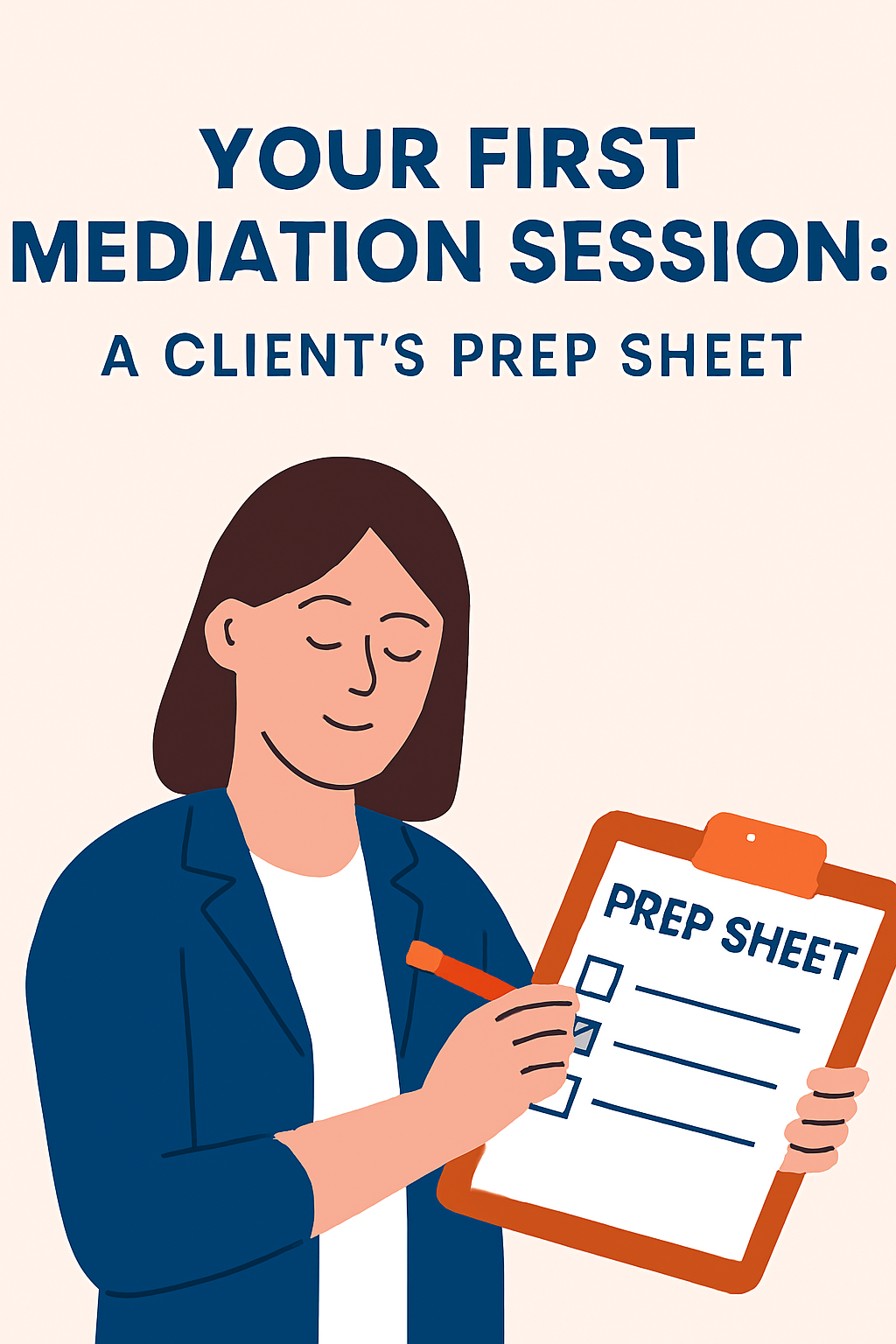Your First Mediation Session: A Client’s Prep Sheet

Mediation can feel unfamiliar and even intimidating, especially if it’s your first time walking into a session. Whether you’re a personal injury plaintiff recovering from an accident, a business owner facing a contract dispute, or an employee navigating a workplace conflict, preparation is the key to success.
This guide is designed to serve as a practical prep sheet for first-time mediation clients in Philadelphia, South Jersey, and surrounding areas. It will walk you through what mediation is, why it works, and how you can enter your first session with clarity and confidence. For a guide to assist attorneys, click here.
What is Mediation? (And Why It Works in Disputes)
At its core, mediation is a neutral, confidential process where a trained neutral mediator facilitates communication between parties in conflict. Unlike a judge or arbitrator, the mediator doesn’t impose a decision; they facilitate conversations between the parties to help reach an agreement.
Why clients choose mediation:
- Confidentiality: Discussions remain private, unlike public court proceedings.
- Control over the outcome: You and the other side decide the resolution, not a judge or jury.
- Cost-effectiveness: Mediation is often less expensive than trial or arbitration.
- Preservation of relationships: Especially valuable in business and employment cases, where parties may need or want to continue working together.
Common situations where mediation is used:
- Personal injury settlements: Negotiating fair compensation for medical expenses, lost wages, and pain and suffering.
- Business disputes: Resolving contract disagreements, partnership dissolutions, or vendor issues.
- Employment conflicts: Addressing claims of wrongful termination, workplace discrimination, or unpaid wages.
For clients in the Philadelphia area and South Jersey, mediation has become a widely used alternative to litigation, especially in personal injury, business, and employment matters.
Why Preparation Matters for First-Time Mediation
Walking into mediation without preparation is like stepping into a meeting without an agenda; you’re simply at a disadvantage. Preparation is crucial because it:
- Reduces anxiety and uncertainty: You’ll know what to expect.
- Helps you focus on priorities rather than emotions: Mediation works best when parties look beyond anger and concentrate on solutions.
- Improves communication: You’ll be able to express your position clearly to both your attorney and the mediator.
- Increases the likelihood of resolution: Prepared clients often reach stronger, fairer settlements that last.
Step-by-Step Prep Sheet for Your First Mediation Session
Here’s your client checklist for entering your first mediation session:
1. Understand the Mediation Process
Most mediations follow a general structure:
- Introductions by the mediator.
- Opening statements from each party or their attorney.
- Joint discussion where each side can speak.
- Private caucuses, where the mediator meets with each party separately.
- Negotiation facilitated by the mediator.
- Agreement drafting if a resolution is reached.
Unlike trials or arbitration, mediation is flexible and less adversarial. In Philadelphia and South Jersey, mediators often tailor the process depending on whether the matter involves personal injury, business, or employment disputes.
2. Know Your Role as a Client
Your role depends on your dispute type:
- Personal Injury Plaintiffs: Be prepared to discuss your injuries, medical treatment, and how the accident has impacted your daily life. Emotional impact is important, and having documentation to support your claim is even more powerful.
- Business Entities: Identify your real interests—whether it’s preserving a long-term partnership, resolving a contract issue, or protecting your reputation.
- Employees: Be ready to discuss workplace events, your damages, and your goals—whether that’s reinstatement, settlement, or simply closure.
3. Work Closely with your Attorney
Mediation is a team effort. Before the session:
- Review the mediation brief prepared by your attorney and evidence together.
- Set clear expectations for potential outcomes and settlement ranges.
- Develop non-verbal communication signals to use during the session.
Your attorney is your advocate, but your active participation ensures your voice is heard.
4. Ensure Your Attorney Has the Right Documents and Information
Documentation strengthens your position. This includes, but is certainly not limited to:
- Personal injury cases: Medical bills, treatment records, wage loss information, and accident reports.
- Business disputes: Contracts, invoices, email correspondence, and financial records.
- Employment disputes: HR files, emails, payroll records, employee handbooks, and company policies.
Bringing organized documentation allows the mediator and the other side to better understand your position.
5. Prepare Your Mindset and Expectations
A successful mediation requires the right outlook:
- Resolution is the goal. It’s not about “winning” or “losing,” but finding a resolution both sides can live with and grow from.
- Be ready for emotional moments. Disputes can be personal and intense, but staying calm helps negotiations move forward.
- Keep the bigger picture in mind. Settlement often provides closure and a faster path to moving forward compared to years of litigation.
6. Logistics to Remember
- Timing: Mediations can last several hours or an entire day. Clear your schedule to avoid distractions.
- Location: Mediations are often held at law offices or neutral conference centers in Philadelphia, South Jersey, or the surrounding areas.
- Virtual Mediation: If participating online, check your technology, choose a quiet location, and ensure stable internet. Tip: For virtual mediations, sit in the same location as your attorney —it strengthens communication.
Common Challenges First-Time Mediation Clients Face
It’s normal to encounter bumps during your first mediation. Some of the most common include:
- Unrealistic settlement expectations. Work with your attorney to set a reasonable range beforehand.
- Difficulty letting go of emotions. Focus on the future rather than rehashing past grievances.
- Feeling pressured. Remember, no one can force you into an agreement; you’re always in control.
- Confusion about the mediator’s role. The mediator is a neutral guide, not a judge or advocate.
How to Avoid These Pitfalls:
- Prepare with your attorney.
- Take breaks if overwhelmed.
- Ask questions—your mediator is there to help you understand the process.
The Mediator’s Role in Your Session
Mediators serve as neutral facilitators. They do not decide the case or favor one side. Instead, they:
- Encourage communication.
- Help identify shared interests.
- Guide parties toward a workable resolution.
In Philadelphia and South Jersey, many mediators are former litigators, judges, or attorneys with deep experience in specific practice areas like personal injury, business law, or employment law.
Trust in the mediator’s neutrality is essential for productive negotiations.
After the Mediation: What Happens Next?
The outcome of mediation can go one of two ways:
- Settlement reached: The agreement is drafted, signed, and becomes binding.
- No settlement: Options include another mediation session, follow-up calls from the mediator, or proceeding to trial or arbitration.
Regardless of the outcome, mediation provides clarity about your dispute and often narrows the issues, making future resolution easier.
Practical Tips to Succeed in Your First Mediation
Keep these simple strategies in mind:
- Dress comfortably but professionally.
- Be respectful—even when emotions run high.
- Take breaks when needed.
- Keep an open mind and trust the process.
These small steps can make a big difference in your experience and outcome.
Conclusion
Preparation is the secret ingredient to a successful mediation. By understanding the process, working with your attorney, organizing your documents, and entering with the right mindset, you can approach your first session with confidence.
Your first mediation doesn’t have to be overwhelming—this prep sheet can help you walk in ready.
At AJS Resolutions, Ari Sliffman brings experience in personal injury, business, and employment mediation to clients across Philadelphia, South Jersey, and nearby communities. Local insight often makes the difference between a stalled negotiation and a successful resolution. Contact AJS Resolutions to learn how we can help guide your dispute toward a fair and lasting resolution.
